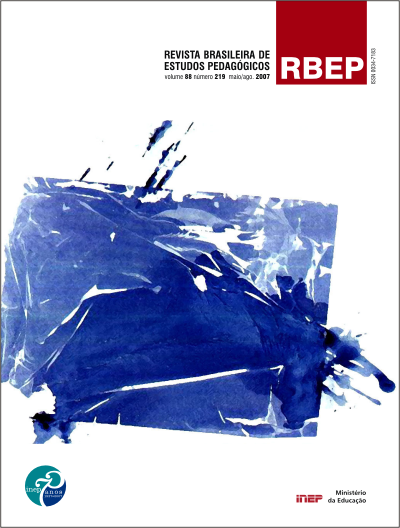Aprendizagem e normalidade: reflexões sobre o "não" aprender como parâmetro de exclusão
Resumo
Tem como objetivo discutir a (não) aprendizagem de conceitos acadêmicos e de condutas e hábitos socialmente validados como parâmetro de (a)normalidade e, assim, de exclusão social. A argumentação base é a de que as definições de (a)normalidade, principalmente as que categorizam a deficiência mental, se atêm, primeiramente, a determinadas concepções do que é a mente, do que significa aprender e de quem é o sujeito cognoscente, antes que a atributos portados pelo "anormal" em si. Metodologicamente, a questão da constituição da (a)normalidade da aprendizagem é analisada sob três modelos de cognição: o cognitivismo, o conexionismo e o dinamicismo. Pelos resultados se levanta a reflexão de que, concebendo-se a cognição por referenciais teóricos ligados ao dinamicismo, as delimitações de anormalidade mental, ora existentes, se fragilizam. Como conclusão, longe de negar a existência da deficiência, se assevera que é possível conceber o deficiente como um ser não afastado da ordem, abrindo caminhos para pensar práticas socioeducacionais que lhe permitam constituir-se, de fato, como sujeito. Palavras-chave: aprendizagem; cognição; deficiência; sujeito cognoscente. Abstract The aim of this article is to debate the (non) learning of academic concepts, behaviors and habits socially validated as parameter of (ab)normality, and thus, of social exclusion. The basic claim is that the current definitions of (ab)normality, mainly the ones that categorize the mental deficiency, if abides firstly to definitive conceptions about "what is the mind", "what does it mean to learn" and "who is the cognoscenti being"; before that the attributes carried for the "abnormal person" himself. Methodologically speaking the question of the learning ab(normality) constitution is analyzed in three cognitive models: the cognitivism, the conexionism and the dynamicism. From the results, one reflects the following: when conceiving cognition on dynamicism, the existing theoretical bias of mental abnormality is powerless. Far from the denying the existence of the deficiency as conclusion, one claims that it is possible to conceive the person with special needs not as a being drawn away from the order, opening ways to think socio-educational practices that allows him to be, in fact, a being. Keywords: learning; cognition; deficiency; cognoscente being.Downloads
Não há dados estatísticos.
Publicado
01-08-2007
Como Citar
BISSOTO, M. L. Aprendizagem e normalidade: reflexões sobre o "não" aprender como parâmetro de exclusão. Revista Brasileira de Estudos Pedagógicos, v. 88, n. 219, 1 ago. 2007.
Edição
Seção
Estudos
A aceitação do artigo implica automaticamente a cessão de seus direitos autorais ao Instituto Nacional de Estudos e Pesquisas Educacionais Anísio Teixeira (Inep).
A Revista Brasileira de Estudos Pedagógicos adota, desde 2016, a licença CC-BY.
A reprodução total ou parcial dos artigos da Revista é permitida desde que citada a fonte de publicação original e o link para a licença CC BY 4.0 e que sejam indicadas eventuais alterações no texto.




















